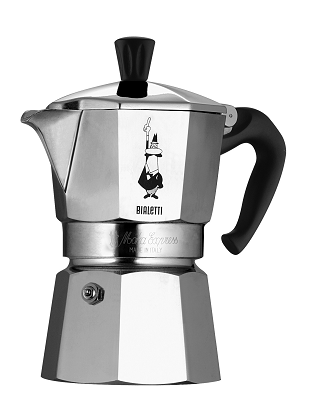Design Classics
Moka Express
Espresso Maker, 1933
Designer: Alfonso Bialletti
Manufacturer: Bialletti

Alfonso Bialetti was not a designer. He was the innovative owner of a small metal and machine shop in northern Italy that manufactured household products. Legend has it that while watching local women wash clothes in a sealed boiler with a basket and a small central pipe to draw up the soapy water he had a eureka moment. Why not use the same principle to brew coffee? His dream was to allow Italians to enjoy intense, steam-brewed coffee at home without the skills of a barista or the rumbling expensive equipment of the café.
WHAT
The Moka Express is the unlikely combination of two materials – aluminium and coffee. Because of import embargoes on steel, Mussolini directed Italian manufacturers to rely on local materials. And since Italy’s only natural metal resource was bauxite, aluminium was declared the “true Italian metal.” Bialetti started his tinkering in the 1920s and developed a simple, faceted base and top with an internal metal basket for the coffee. It’s said (clearly by those who downplay the fears of cooking with aluminium) that the residue of coffee from previous use combined with calcium deposits on the aluminium adds depth of flavour to the brew. Bakelite handle and knobs prevented scorched fingers.
WHEN
It was not until 1933 that Bialetti solved the technical problems. He hawked his espresso makers at local outdoor markets, selling 10,000 per year. After the Second World War, Alfonso’s son, Renato, expanded the company. Recognizing the opportunity to propel sales in the post-war boom, when incomes rose and aluminium prices fell, he launched a sophisticated national marketing campaign. To differentiate the Bialetti from the swarm of competitors flooding the market, he developed the company mascot – “the little man with the moustache.” a caricature of his father. The perky fellow with his finger pointed in the air as if ordering a coffee symbolized the nostalgic ideal of an avuncular Italian of another era who whiled away his days in a café. While minor changes to the original design have been made and newer-fangled models added, more than 300 million Moka Express have been sold around the world.
WHY Why choose a decidedly low-tech coffee maker that has basically not changed for almost 70 years? It’s the unbroken line of tradition from Alfonso the innovator to Renato the marketer, focused on one express (pun intended) purpose – to make and sell a sturdy, long-lasting product that allows ordinary people to enjoy coffee “at home just like in a coffeehouse.” This authenticity makes the Moka Express – along with the Vespa and FIAT 500 – an inspiring and democratic icon of Italian design.
National Post, March 23, 2006.
